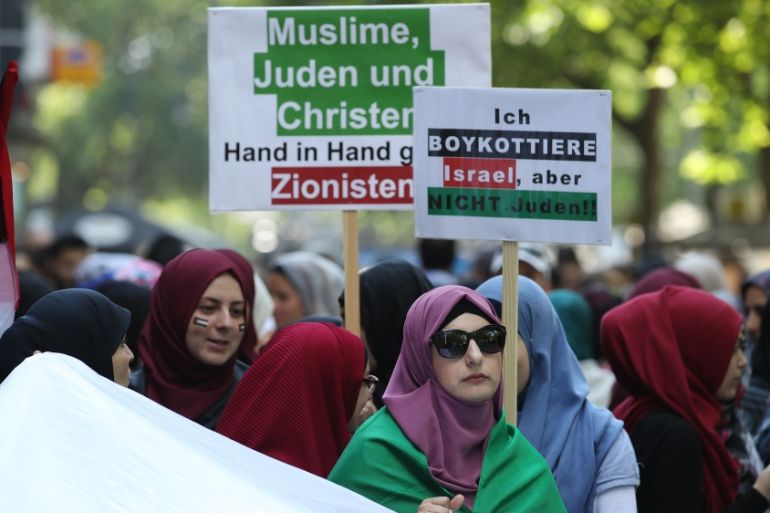German, Austrian cultural groups denounce anti-BDS resolution
‘Accusations of anti-Semitism are being misused to push aside important voices,’ say high-profile figures in the arts.

Dozens of leading German and Austrian cultural institutions have denounced an anti-Israel boycott resolution in the German parliament, saying it suppresses freedom of speech.
In a news conference in Berlin, the signatories to the statement on Thursday criticised what they considered to be threats to freedom of speech caused by last year’s resolution.
Keep reading
list of 4 itemsBDS: In the crosshairs of human rights colonialism
‘Deeply damaging’: Anger as Boris Johnson plans ‘anti-BDS’ law
Biden draws ire of Palestinian activists for shunning BDS efforts
“We reject the BDS boycott of Israel since we consider cultural and scientific exchange to be essential. At the same time, we consider the logic of counter-boycott, triggered by the parliamentary anti-BDS resolution, to be dangerous,” the statement read.
“By invoking this resolution, accusations of anti-Semitism are being misused to push aside important voices and to distort critical positions.”
The resolution, passed in May 2019, calls on the German government “not to financially support any projects that call for the boycott of Israel, or actively support the BDS campaign”.
The BDS campaign, or Boycott, Divestment, Sanctions movement, is a demand from Palestinian civil society calling on the international community to boycott, divest from and impose sanctions on the State of Israel and its representatives to pressure Israel to apply international law towards the Palestinian people.
The statement comes in the aftermath of a national scandal surrounding the cancellation of renowned Cameroonian philosopher and public intellectual Achille Mbembe from the Ruhr Triennale Festival earlier this year.
The decision to pull Mbembe from the festival came after sustained pressure spearheaded by right-wing German politicians and media outlets, which focused on his statements in support of the BDS campaign.
“It is unproductive, even detrimental to the democratic public sphere to exclude vital voices from critical dialogue, as occurred in the debate surrounding Achille Mbembe earlier this year,” the signatories said in the statement. “Germany‘s historical responsibility should not lead to a general delegitimisation of other historical experiences of violence and oppression, neither morally nor politically.”
Stefanie Schüler-Springorum, the head of the Center for Research on Antisemitism of the Technical University in Berlin, claimed that the anti-BDS resolution had placed all open debates on anti-Semitism in Germany under “general suspicion”, and that researchers of anti-Semitism had been subject to “public defamation campaigns”.
The group of institutions calls itself the Initiative for Cosmopolitanism and Section 5.3, which refers to the independence of culture and the sciences guaranteed in the German Basic Law.
The initiative includes federally funded cultural institutions such as Goethe-Institut and Federal Cultural Foundation, as well as the state-run Federal Agency for Civic Education and several national museums and art foundations.
The group confirmed that, contrary to the parliamentary resolution, they will no longer ban supporters of the BDS movement from being invited to their institutions.
Christoph Möllers, a professor for public law who spoke at Thursday’s news conference, said, “Public funds for art and science cannot nor should not be allocated according to political criteria.”
Representatives of the institutions also called for the parliamentary resolution to be revised, and demanded an open debate to be held on the International Holocaust Remembrance Alliance (IHRA) definition of anti-Semitism.
Critics of the IHRA definition claim it misleadingly defines many legitimate criticisms of Israel as anti-Semitic and can be used to stifle free speech.
Shuruq Josting, representative of the Germany-based organisation Palestine Speaks, strongly supports the revision of the resolution as a “step into the right direction”, though she criticises that the issues of the Palestinian community “who cannot speak of their rights or heritage” are not being addressed.